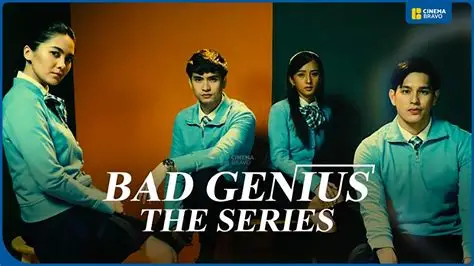
Bad Genius: The Series (2025)
Bad Genius: The Series (2025) is one of the most anticipated Philippine television dramas of the year, blending crime, thriller, and coming-of-age elements. Directed by acclaimed filmmaker Derick Cabrido and starring Atasha Muhlach, Jairus Aquino, Gab Lagman, and Hyacinth Callado, this Filipino-language series is set to premiere on July 17, 2025 exclusively on Viva One.
Movie Overview
Bad Genius: The Series is a Philippine adaptation of the critically acclaimed 2017 Thai film Bad Genius. Just like its predecessor, the series explores themes of academic pressure, corruption, and the moral dilemmas faced by gifted students. However, the Philippine version adds local cultural nuances, deeper character arcs, and a fresh setting, making it more relatable to Filipino audiences. The story follows Lin (played by Atasha Muhlach), a brilliant yet financially struggling student who uses her intelligence to devise elaborate cheating schemes. As the stakes rise, so do the consequences, testing friendships, integrity, and personal limits.
The show is helmed by Derick Cabrido, known for his award-winning works such as *Clarita* and *Mallari*. With Viva Studios backing the project, *Bad Genius: The Series* is positioned to be one of the most talked-about Filipino dramas of 2025, targeting both local and international audiences through streaming platforms.

Attribute Details
| Title | Bad Genius: The Series |
| Genre | Crime, Thriller, Drama |
| Language | Filipino |
| Release Date | July 17, 2025 (Philippines) |
| Director | Derick Cabrido |
| Writer | Adapted screenplay by Viva Studios team (based on the original Thai film by Nattawut Poonpiriya) |
Plot Summary
The series centers around Lin, a scholarship student at the prestigious Colegio de San Gabriel Possenti. Despite her brilliance, Lin feels marginalized due to her humble background. She befriends Grace, a popular yet academically struggling classmate. Initially, Lin helps Grace by tutoring her, but this soon evolves into orchestrating a calculated cheating scheme to help wealthy students pass exams in exchange for money. As their operation grows, so does the risk, drawing them into a high-stakes international standardized test scam.
The drama intensifies as Lin must balance her moral compass, her loyalty to friends, and her desperation to escape poverty. The show also highlights systemic flaws in the education system, the weight of parental expectations, and the allure of shortcuts in the pursuit of success. Each episode escalates with suspense, ultimately questioning whether brilliance should be used for personal gain or for greater good.
Main Cast
- Atasha Muhlach as Lin – The gifted yet conflicted protagonist.
- Jairus Aquino as Bank – Another brilliant student who becomes both ally and rival to Lin.
- Gab Lagman as Pat – A wealthy student who funds Lin’s schemes.
- Hyacinth Callado as Grace Anne Dizon – Lin’s close friend whose struggles set the cheating scheme in motion.
Production & Direction
Directed by Derick Cabrido, known for tackling socially relevant stories, the series promises a slick blend of suspense and moral exploration. The production is handled by Viva Studios, ensuring high-quality visuals, authentic campus settings, and tight storytelling. Cabrido’s vision is to retain the intellectual tension of the original Thai movie while adding Filipino cultural depth, making the dilemmas more relatable to local audiences.
The cast underwent intensive workshops to prepare for their roles, with Atasha Muhlach stepping into her breakout acting performance. According to Cabrido in an interview with PhilStar Life, the series aims to show “the thin line between genius and desperation, and how choices define us more than talent.”
Why You Should Watch
Bad Genius: The Series (2025) isn’t just another campus drama. It’s a sharp social commentary wrapped in thrilling storytelling. Here’s why it deserves a spot on your watchlist:
- Relatable Themes: It reflects the struggles of students under immense academic and societal pressure.
- High Stakes Drama: The tension rises with every exam, making the story addictive.
- Fresh Take: Unlike the Thai original, this adaptation integrates Filipino culture, language, and nuances.
- Talented Cast: Rising stars Atasha Muhlach and Jairus Aquino bring youthful energy and depth.
- Direction: Cabrido’s proven track record ensures a gripping narrative style.
Filming Locations
The series was filmed in key locations across Metro Manila, particularly in academic settings that replicate the elite school atmosphere. The fictional “Colegio de San Gabriel Possenti” was shot in several universities and private schools. https://www.google.com/maps/embed?pb=!1m18!1m12!1m3!1d3861.012299639594!2d121.0221900747356!3d14.592657477771688!2m3!1f0!2f0!3f0!3m2!1i1024!2i768!4f13.1!3m3!1m2!1s0x3397c9fcad28f3df%3A0xa40a3774c355c4!2sViva%20Films!5e0!3m2!1sen!2sph!4v1716928232223!5m2!1sen!2sph
Final Thoughts
Bad Genius: The Series (2025) is poised to be a landmark in Philippine television, combining the intensity of a crime thriller with the emotional depth of a youth drama. Its thought-provoking narrative challenges audiences to reflect on morality, ambition, and the price of success. Whether you loved the Thai original or are new to the story, this adaptation promises a fresh and thrilling experience. Mark your calendars for July 17, 2025, and stream it exclusively on Viva One.
A Fresh Take on a Global Hit
Bad Genius: The Series (2025) brings new life to the internationally acclaimed Thai film, adding a distinct Filipino flavor that resonates with today’s generation. While the original movie captivated audiences with its clever mix of academic pressure and high-stakes cheating, the Philippine adaptation stretches the story into multiple episodes, allowing viewers to see the characters’ deeper struggles, relationships, and motivations. This longer format gives more room for emotional growth, showing how students from different social classes navigate not just exams but also societal expectations and moral dilemmas. It’s not merely a remake—it’s a reimagining tailored for Filipino culture, making it uniquely relevant and engaging.
The Brilliance and Burden of Lin
At the heart of Bad Genius: The Series is Lin, played by Atasha Muhlach in her much-anticipated acting debut. Lin’s character embodies both genius and vulnerability. On one hand, she is the top-performing student with unmatched intelligence, capable of solving problems in seconds. On the other hand, her brilliance becomes a double-edged sword, drawing her into schemes that challenge her integrity. The series highlights the weight of being gifted while struggling financially, making Lin relatable to viewers who know what it feels like to carry both promise and pressure. Through Lin’s story, audiences will see how academic success often comes at a personal cost, particularly in societies where opportunity and privilege are unequally distributed.
Friendship, Loyalty, and Betrayal
One of the most compelling aspects of Bad Genius: The Series (2025) is how it explores friendship under pressure. Lin’s bond with Grace, her wealthy but academically struggling friend, begins with genuine loyalty and care. However, as cheating schemes expand, the foundation of their friendship begins to shake. The show asks difficult questions: Can true friendship survive when money, ambition, and secrecy are involved? The story adds layers of betrayal, reconciliation, and shifting alliances that keep viewers hooked. This is not just a story about exams—it is about how human relationships can either empower us or drag us into moral compromise.
The Thrill of High-Stakes Exams
Every episode of Bad Genius: The Series raises the tension as the characters face increasingly complex cheating operations. From small classroom tricks to international test scams, the stakes rise dramatically, mirroring the intensity of real-life academic systems that often value results over learning. The thrill of these high-stakes operations is balanced with moral conflict—each elaborate plan forces viewers to ask whether intelligence should be used for good or for personal gain. This blend of intellectual puzzles, suspenseful pacing, and emotional stakes makes the show more than just a drama—it feels like a psychological thriller wrapped in a student’s daily life.

The Vision of Derick Cabrido
The director of Bad Genius: The Series (2025), Derick Cabrido, has built a reputation for tackling socially relevant themes with visual flair and emotional depth. Known for films like *Clarita* and *Mallari*, Cabrido brings a sharp eye for tension and storytelling to this project. His vision for the series is not just to replicate the Thai film but to expand its reach by embedding Filipino realities—such as the gaps in educational access, the obsession with academic achievement, and the silent struggles of students from less privileged backgrounds. Cabrido’s direction ensures the show remains gripping while staying grounded in authentic cultural contexts that Filipino audiences will immediately recognize.
A Rising Cast of Talents
The casting choices for Bad Genius: The Series reflect a mix of rising stars and seasoned performers, making the show appealing to both younger and older audiences. Atasha Muhlach steps confidently into the spotlight as Lin, supported by Jairus Aquino, who portrays Bank with quiet intensity. Gab Lagman and Hyacinth Callado round out the lead cast, each adding depth to the drama through their portrayals of privilege and vulnerability. Their performances bring authenticity to the story, ensuring that viewers feel both the weight of the academic scams and the humanity of the characters caught within them. This cast lineup is expected to elevate the show into one of the standout dramas of 2025.
Themes That Hit Close to Home
What makes Bad Genius: The Series (2025) particularly powerful is its ability to connect deeply with everyday Filipino experiences. Many students in the Philippines grow up balancing limited resources, overwhelming expectations, and the constant race to achieve high academic standing. The series amplifies these struggles and wraps them in suspenseful storytelling. At the same time, it sheds light on universal themes—ambition, temptation, betrayal, and redemption—that transcend borders. The result is a story that feels at once uniquely Filipino and globally relevant, ensuring its appeal to both local audiences and international viewers discovering the adaptation for the first time.
Filming in Authentic Settings
The creators of Bad Genius: The Series took great care in selecting filming locations across Metro Manila that capture the elite yet tense atmosphere of private schools. Real universities, libraries, and urban landmarks double as the backdrop for Lin’s journey. These locations do more than provide scenery—they immerse viewers in a world where privilege and struggle exist side by side. The visual storytelling emphasizes contrasts: classrooms filled with wealth and power versus neighborhoods where students like Lin live with limited opportunities. This authenticity makes the series more relatable and heightens the emotional stakes of the narrative.
A Series That Sparks Reflection
Beyond its suspense and thrills, Bad Genius: The Series (2025) invites audiences to reflect on their own choices and values. It challenges viewers to ask: Is success still success if it’s achieved dishonestly? Can ambition justify unethical actions when survival is at stake? These are not easy questions, but the series uses its characters and their decisions to hold up a mirror to society. By the time the season concludes, audiences will likely find themselves questioning the systems that drive such desperation, as well as their own beliefs about morality, privilege, and fairness. This deeper engagement is what sets the series apart as more than entertainment—it becomes a conversation starter.
The Pressure of Academic Competition
One of the strongest storylines in Bad Genius: The Series (2025) is its honest portrayal of how competitive academics can push students into extreme decisions. For many Filipino students, exams are not just about grades—they determine scholarships, future careers, and family pride. Lin and her peers embody this pressure, showing how ambition and desperation can intersect in dangerous ways. The series underscores how systems designed to measure knowledge often end up measuring privilege, leaving talented but underprivileged students like Lin with limited options. This layered exploration makes the series resonate with anyone who has ever felt trapped by expectations they couldn’t meet fairly.
Bank’s Inner Struggle and Growth
Bank, portrayed by Jairus Aquino, is one of the most complex characters in Bad Genius: The Series (2025). Initially portrayed as hardworking and morally upright, Bank becomes entangled in Lin’s schemes when financial hardship threatens his future. His story arc reflects how survival can blur ethical boundaries. Unlike Lin, who is motivated by both survival and recognition, Bank’s internal conflict is more about protecting his dignity while navigating poverty. This struggle makes him one of the most relatable characters, as audiences witness his gradual transformation from a principled student to a participant in high-risk academic fraud.
Grace and the Privilege Divide
Grace, played by Hyacinth Callado, serves as the emotional counterbalance to Lin. Coming from a wealthy background, Grace struggles academically and leans on Lin’s intelligence to succeed. Their relationship highlights the privilege divide—where one student fights for survival and another leans on wealth to coast through life. Yet Grace’s character isn’t just about privilege; she also represents the genuine bonds of friendship that can complicate ethical decisions. Through Grace, the series reveals how privilege and dependency can distort relationships, forcing both friends to question what loyalty really means when moral choices are at stake.
The Evolution of Cheating Tactics
One of the most gripping elements of Bad Genius: The Series (2025) is the evolution of cheating methods. The series doesn’t just stick to simple tricks like hidden notes or hand signals. Instead, it elevates the suspense with elaborate operations that mirror real-world examination scams. From manipulating answer sheets to coordinating international time zones for standardized tests, each scheme grows bolder and riskier. These tactics keep viewers on the edge of their seats while also emphasizing how intelligence, when misapplied, can become a dangerous tool. The thrill of watching these methods unfold is part of what makes the series so addictive.
A Soundtrack That Elevates the Tension
The music and sound design in Bad Genius: The Series play a crucial role in shaping its atmosphere. Suspenseful beats underscore exam room tension, while softer, emotional tracks highlight the struggles of friendship and morality. The soundtrack balances high-energy sequences with reflective moments, guiding viewers through the emotional highs and lows of the story. For Filipino audiences, the inclusion of locally composed pieces adds cultural texture, making the series feel even more authentic. Just as the characters’ intelligence drives the plot, the music drives the emotional impact, leaving a lasting impression long after each episode ends.
Critical Reception and Anticipation
Even before its release, Bad Genius: The Series (2025) has generated buzz across Southeast Asia and beyond. Critics and fans alike are eager to see how this adaptation will compare to the Thai original while also standing on its own. With a talented cast, a visionary director, and a socially relevant story, the series is expected to draw both critical acclaim and commercial success. Its universal themes of ambition, morality, and friendship ensure a wide appeal, while its cultural grounding in the Philippines makes it unique. The anticipation reflects the growing global recognition of Filipino television as a source of high-quality storytelling.
The Message Beyond the Exams
At its core, Bad Genius: The Series (2025) is not just about cheating in exams—it’s about life’s larger tests. The show makes audiences question whether success is defined by grades, wealth, or character. It points to systemic flaws in education and society that force brilliant students to make desperate choices. By focusing on the personal journeys of Lin, Bank, and Grace, the story becomes a metaphor for survival in an unequal world. Ultimately, the message is clear: integrity, though difficult to uphold, remains more valuable than any exam result. This layered meaning ensures the series stays relevant long after the credits roll.
Why This Adaptation Matters
Bad Genius: The Series (2025) matters because it goes beyond entertainment—it reflects pressing social issues. In a country where education is often the only way out of poverty, the show mirrors real struggles faced by countless students. It highlights systemic inequality, questions societal values, and sparks conversations about how far people are willing to go to achieve success. By adapting a Thai classic into a Filipino setting, the series doesn’t just tell a story—it amplifies voices and realities that deserve global recognition. It’s this cultural significance that makes the series more than just another TV drama—it becomes a statement.
Frequently Asked Questions (FAQs) About Bad Genius: The Series (2025)
1. What is Bad Genius: The Series (2025)?
Bad Genius: The Series (2025) is a Philippine television adaptation of the hit Thai movie *Bad Genius*. It reimagines the original film into a multi-episode format, giving viewers more depth in character development and storyline. The series explores high-stakes academic cheating, friendships under pressure, and the challenges faced by students in unequal educational systems.
2. Who directed Bad Genius: The Series (2025)?
The series is directed by Derick Cabrido, a filmmaker known for tackling socially relevant stories with tension and realism. His direction ensures that Bad Genius: The Series (2025) is not just a remake but a fresh adaptation that resonates with Filipino culture and society.
3. Who plays the lead role in Bad Genius: The Series (2025)?
The lead character, Lin, is portrayed by Atasha Muhlach in her acting debut. Her performance is central to Bad Genius: The Series (2025), bringing intelligence, vulnerability, and emotional conflict to life in a way that captivates audiences.
4. What is the release date of Bad Genius: The Series (2025)?
Bad Genius: The Series (2025) is scheduled for release in 2025, marking one of the year’s most highly anticipated drama series. Fans are eager to see how this adaptation expands the universe of the original movie while adding fresh Filipino cultural perspectives.
5. What genre is Bad Genius: The Series (2025)?
Bad Genius: The Series (2025) blends drama, thriller, and coming-of-age storytelling. The series balances suspenseful exam-cheating schemes with heartfelt moments of friendship, loyalty, betrayal, and survival, creating a unique genre mix for audiences.
6. How does the series differ from the original Thai film?
Unlike the two-hour Thai film, Bad Genius: The Series (2025) expands into multiple episodes, providing more space to explore character backstories, relationships, and emotional conflicts. This makes the adaptation richer, deeper, and more culturally aligned with Filipino realities.

7. What is the central theme of Bad Genius: The Series (2025)?
The central theme of Bad Genius: The Series (2025) is the conflict between ambition and morality. It explores how academic pressure, financial struggles, and social inequality push brilliant students into ethical dilemmas that test their values and friendships.
8. Who are the other main cast members of Bad Genius: The Series (2025)?
Alongside Atasha Muhlach as Lin, the cast includes Jairus Aquino as Bank, Gab Lagman, and Hyacinth Callado. Each actor brings depth to Bad Genius: The Series (2025), portraying different sides of privilege, pressure, and ambition in the academic world.
9. What makes Lin such a compelling character?
Lin in Bad Genius: The Series (2025) is compelling because she embodies both brilliance and struggle. Her intelligence makes her indispensable in cheating schemes, but her financial situation forces her into morally gray areas, reflecting the real dilemmas faced by many students.
10. What role does Bank play in the story?
Bank in Bad Genius: The Series (2025) is the hardworking, principled student who becomes conflicted when drawn into cheating schemes. His journey highlights how poverty and desperation can blur ethical boundaries, making him one of the show’s most relatable characters.
11. How is friendship portrayed in the series?
Bad Genius: The Series (2025) portrays friendship as both a strength and a weakness. Lin and Grace’s relationship begins with loyalty but becomes strained by academic fraud and privilege differences, reflecting the complexity of real-life friendships under pressure.
12. What makes the cheating schemes in the series exciting?
The cheating schemes in Bad Genius: The Series (2025) grow increasingly elaborate, from small tricks to international exam scams. These high-stakes operations keep viewers engaged while raising moral questions about using intelligence for dishonest purposes.
13. How does the series reflect Filipino culture?
Bad Genius: The Series (2025) incorporates Filipino educational struggles, such as limited opportunities, the weight of family expectations, and the gap between privileged and underprivileged students. This makes the story resonate deeply with local audiences.
14. What message does the series send about education?
The message of Bad Genius: The Series (2025) is that education, while important, is often tied to privilege and inequality. It critiques systems that push students to value grades over integrity, encouraging reflection on the flaws in academic competition.
15. Is the series just about cheating?
No, Bad Genius: The Series (2025) goes beyond cheating. It explores morality, survival, friendship, privilege, and ambition. Cheating becomes the lens through which deeper human and societal issues are examined, making the series meaningful and impactful.
16. What filming locations were used?
Bad Genius: The Series (2025) was filmed across Metro Manila, using real schools, libraries, and urban neighborhoods. These authentic locations highlight the contrast between privilege and struggle, reinforcing the series’ cultural relevance and realism.
17. How important is the soundtrack to the series?
The soundtrack of Bad Genius: The Series (2025) enhances tension and emotion, with suspenseful beats for exam scenes and softer tracks for character moments. Music plays a key role in amplifying the thrill and drama of the story.
18. How has the series been received by critics?
Even before its official release, Bad Genius: The Series (2025) has gained significant attention from critics and fans. Early responses highlight its strong cast, meaningful storytelling, and cultural authenticity as reasons for its high anticipation.
19. What lessons can viewers take from the series?
Viewers of Bad Genius: The Series (2025) learn that success without integrity is hollow. The series encourages reflection on morality, societal pressures, and the consequences of choices, making it more than just a suspenseful drama.
20. How does the adaptation expand the original story?
By stretching the story into a full series, Bad Genius: The Series (2025) explores deeper character arcs, more detailed cheating schemes, and a broader social commentary, offering a richer and more layered narrative than the film.
21. Why is Lin’s financial struggle important?
Lin’s financial struggle in Bad Genius: The Series (2025) symbolizes the real-life challenges many students face. It grounds her decisions in survival rather than greed, making her story relatable and emotionally powerful.
22. How is privilege represented in the show?
Bad Genius: The Series (2025) contrasts the lives of wealthy students like Grace with underprivileged students like Lin and Bank. This highlights systemic inequalities in education, showing how privilege influences opportunities and outcomes.
23. Is the series only for young audiences?
While Bad Genius: The Series (2025) focuses on students, its themes of morality, ambition, and survival appeal to all ages. Parents, educators, and professionals will find value in its social commentary and relatable conflicts.
24. What role does family play in the series?
Family is central in Bad Genius: The Series (2025), especially for characters like Lin and Bank, whose parents’ financial struggles drive their decisions. The show emphasizes how family expectations can both inspire and burden students.
25. How does Bank’s character evolve?
Bank’s journey in Bad Genius: The Series (2025) is one of moral conflict and reluctant participation in cheating schemes. His evolution highlights the pressure of survival and the difficulty of maintaining integrity under hardship.
26. What does Grace’s character symbolize?
Grace in Bad Genius: The Series (2025) symbolizes privilege and dependency. She shows how wealth can mask academic struggles but also how friendship and loyalty can be tested when personal success is on the line.
27. How does the series build suspense?
Bad Genius: The Series (2025) builds suspense through intricate cheating plans, exam tension, and moral dilemmas. Each episode escalates the stakes, keeping viewers emotionally and intellectually invested in the outcome.
28. Does the series have a moral lesson?
Yes, the moral of Bad Genius: The Series (2025) is that dishonesty, no matter how clever, has consequences. It encourages viewers to value integrity and resilience over shortcuts, making it a socially impactful drama.
29. Is the series suitable for international viewers?
Bad Genius: The Series (2025) is designed for both local and global audiences. Its themes of pressure, ambition, and inequality are universal, while its Filipino cultural elements give it a unique international appeal.
30. How many episodes will the series have?
Bad Genius: The Series (2025) is expected to have multiple episodes, each delving into different stages of the academic scams and character conflicts. The episodic format allows for deeper storytelling than the original film.
31. Why is the series considered socially relevant?
Bad Genius: The Series (2025) is socially relevant because it reflects real issues in education, including inequality, pressure, and the flawed value placed on grades. It sparks conversations about how society shapes student behavior.
32. How does the series explore morality?
Morality in Bad Genius: The Series (2025) is explored through characters forced to choose between survival and integrity. Each decision has consequences, making viewers question what they would do in similar situations.
33. Will the series appeal to fans of the original film?
Yes, Bad Genius: The Series (2025) appeals to fans of the film while offering new depth and a fresh cultural perspective. It honors the spirit of the original but expands the story for modern and Filipino audiences.
34. How does the adaptation enhance the emotional impact?
The series format of Bad Genius: The Series (2025) allows for extended emotional arcs, giving viewers time to connect deeply with characters. This makes betrayals, victories, and moral struggles more powerful and moving.
35. Why should you watch Bad Genius: The Series (2025)?
You should watch Bad Genius: The Series (2025) because it combines suspense, cultural relevance, and powerful performances. It’s not just about exams—it’s about life, morality, and survival, making it one of the most meaningful and thrilling dramas of 2025.



